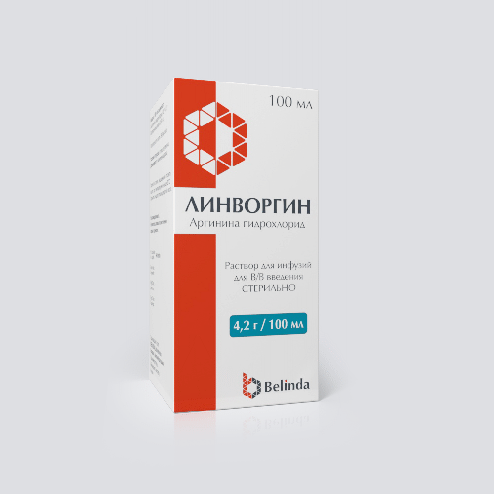
Linvorgin
PRESCRIPTION
For atherosclerosis of the blood vessels of the heart and brain
Manual
Every 100 ml contains:
- L-Arginine Hydrochloride USP 4.2 g
- Water for injection USP
As part of complex therapy for the following diseases:
Atherosclerosis of the vessels of the heart and brain, atherosclerosis of peripheral vessels, including with manifestations of intermittent claudication, diabetic angiopathy, coronary heart disease, arterial hypertension, conditions after acute cerebrovascular accident, myocardiopathy, chronic heart failure, hypercholesterolemia, angina pectoris, chronic obstructive diseases lungs, interstitial pneumonia, idiopathic pulmonary hypertension, chronic post-embolic pulmonary hypertension, acute and chronic hepatitis of various etiologies, hyperammonemia, hypoxic conditions, asthenic conditions in the process of convalescence, including after infectious diseases and surgical interventions, metabolic alkalosis, decreased function of the thymus gland, fetal growth retardation and preeclampsia.
The drug is administered intravenously at a rate of 10 drops per minute for the first 10 to 15 minutes, then the rate of administration can be increased to 30 drops per minute.
The daily dose is 100 ml of solution. In case of severe circulatory disorders in the central and peripheral vessels, with severe symptoms of intoxication, hypoxia, and asthenic conditions, the dose can be increased to 200 ml per day. The maximum rate of administration of infusion solutions should not exceed 20 mmol/hour.
For children under 12 years of age, the dose of the drug is 5 – 10 ml per 1 kg of body weight per day. For the treatment of metabolic alkalosis, the dose can be calculated as follows: Amount of drug (ml) = arginine hydrochloride (mmol) / excess alkalis (Weight)(mmol/l) x 0.3 x kg body weight Administration should begin with half the calculated dose. Possible additional corrections should be made after receiving the results of the updated acid-base balance. Children. The drug is used for children over 3 years of age.